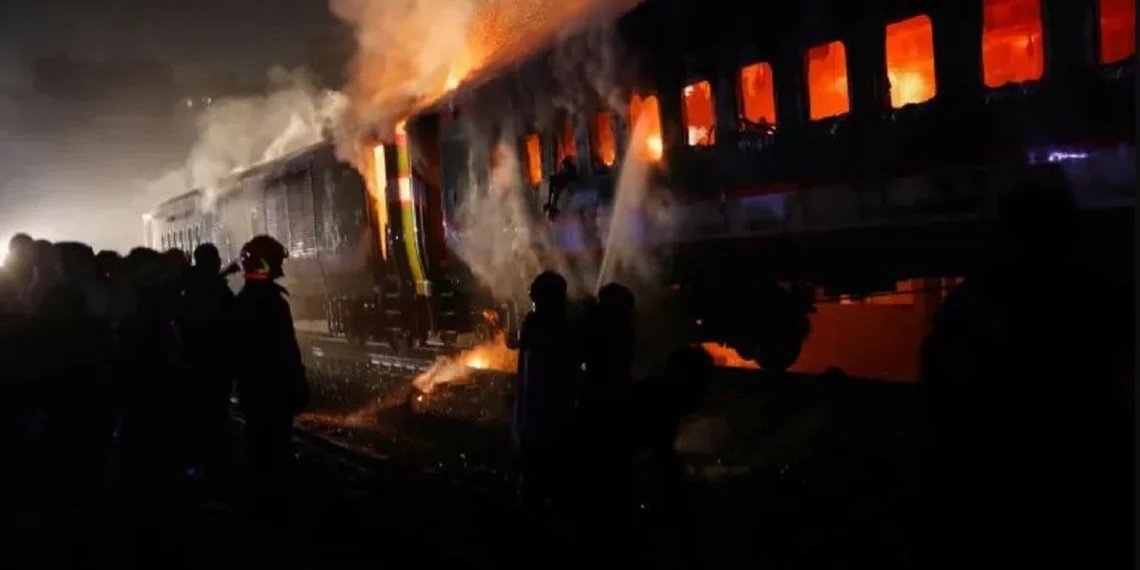Bangladesh’s Detective Branch Joint Commissioner Harun ur Rashed and his team of sleuths acted with unusual alacrity and speed to “crack” the case involving the January 5 torching of the Benapole Express train that charred four passengers to death at Gopibagh on the outskirts of Dhaka.
It took less than 12 hours for the DB sleuths to arrest eight alleged miscreants supposedly associated with the BNP’s youth and students’ wing, as if they were waiting to be arrested at one location. Secondly, it took no more than two hours for the police to discover a hideout where crude bombs, Molotov Cocktails and other materials for reportedly stashed away. The police did not make clear for what purpose and who had hidden away these so-called bombs.
This morning, a video clip – shot by an unidentified person, most likely a DB sleuth – emerged, showing an alleged Juba Dal cadre “admitting” to “conspiring online” to set fire to the train. There was no sign of any strain on the man’s face. He appeared to be “fresh” – no crumpled clothes; his hair was in perfect order; there was no outwardly visible signs of any interrogation.
As coolly and casually as he narrated the “conspiracy” story, a copy of the holy Quran had been conveniently placed on a coffee table placed before the “arrested” man. And he as conveniently reached out for the holy Quran to “swear” that he was “telling the truth”. Where did that holy Quran copy come from? And why was it placed before the alleged miscreant?
Rashed, in effect, sought to use a planted copy of the holy Quran to propagate a lie and a cooked up case in a country that is predominantly Islamic and where people do not take kindly to such gross acts that potentially insult Islam.
But there is more to the train burning story. Investigations by the Northeast News and enquiries with multiple Bangladeshi railway officials point the finger of suspicion at the Directorate General of Forces Intelligence (DGFI) that has been found in the past to have played lead roles in undertaking crude operations to “frame and fix” individuals and groups.
A senior officer of Bangladesh Railways mechanical department revealed that “circumstantial evidence, in the absence of forensic information now, suggests that no accident or mechanical malfunctioning but sabotage may have caused the fire”.
The three-layered metallic structure – comprising layers of stainless steel, carbon steel and aluminium sheets – of the bogies make them near-fire proof, the railway official said, adding that the fire broke out in the air-conditioned coaches that were equipped with air-tight windows and therefore it would have been impossible for inflammable substances to have been thrown in from outside.
The railway officials suspect that highly inflammable chemicals such as petrol, ethanol and nitrocellulose may have been used by the miscreants. While a thorough forensics examination of the charred coaches would reveal whether inflammable chemical substances were used, the railway officials questioned whether the ticket examiners and Ansar guards were at all on the train or not.
“They must be tracked down and questioned. That is what the Detective Branch should focus on rather than video-filming obscure persons swearing by the holy Quran,” a senior Bangladesh Railways official said, adding that any police investigation must include his senior colleagues “who would be able to shed more light on the sabotage”.
What is eyebrow-raising is that an Indian Hindi TV new channel reporter asked leading questions to Rashed. The questions were in Hindi and Rashed responded in Bengali.
Clearly, one did not understand the other and yet an effort was made to propagate the police’s theory that the BNP and its students and youth wing supporters conspired to set the Benapole Express on fire.
Rashed, of course, rattled away the police’s so-called findings, including the names of the miscreants who had held allegedly “conspired online” to set the Benapole Express on fire.















